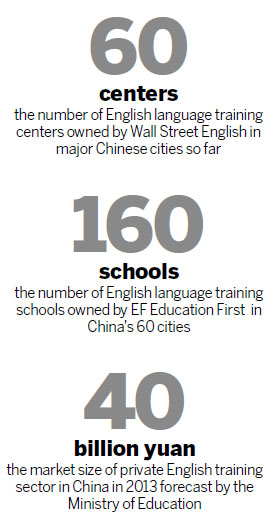The China afficionado teacher
Updated: 2012-07-26 08:00
By Wang Hongyi in Shanghai (China Daily)
|
||||||||
|
An English training center in Beijing. The English training market in China is now worth around 30 billion yuan ($4.7 billion). Hu Ke / for China Daily |

Spry septuagenarian passes on his passion to every one of his 450 learning centers worldwide
He has a Chinese name, Li Wenhao; he loves Chinese culture and carries the classic Chinese text by Laotzu, Tao Te Ching, in his pocket every day. His enthusiasm and fascination with Chinese culture makes him want to spend the rest of his life in the country.
Luigi T. Peccenini, is the founder of Wall Street English, one of the leading English training bodies in the world, which now has more than 450 learning centers in 27 countries and regions around the world, the number of its learners surpassing 2 million.
The 73-year-old is energetic and effervescent, vigorous and vibrant. He passes on his enthusiasm and passion to the training centers at Wall Street English, which is regarded as part of the reason for their popularity.
Despite his great success in business, however, Peccenini prefers to regard himself as an educator built on a rich life experience.
He has repeatedly emphasizes during his lectures to college students and young entrepreneurs his mantra: "I was not born to be a businessman; instead, I have been and will always be an educator. My business is only a small tool, which helps me become an educator on a more spacious international stage, which enables me to serve more people. This is my ideal, one that advocates freedom and independence."
Peccenini was born in 1939, the only child of a modest Italian family. As a young man he worked in a factory and later became involved in sales. But always on his mind was the nagging existential question: "What is the meaning of life?"
He said: "Today, this questions is still present in my mind. I've always thought that life is a wonderful gift and that anything I would do and anybody I would meet along the way would help me to find the answer."
The path through his life was not always smooth or easy. Like many entrepreneurs, Peccenini experienced numerous hardships and frustrations on the road to starting up his business.
In 1972, he stepped into the English training sector with the foundation of the Wall Street Institute after having tasted some sweetness during his entrepreneurial career in the computer literacy training business in Italy in 1968. By 1980, the institute had more than 50 learning centers in Italy.
Peccenini invested all his money into developing English Online, a state-of-the-art multimedia language instructional program at that time. He also borrowed heavily from banks and individual investors, planning to face heavy financial exposure through high sales. But it didn't work out. As a result, his company closed down. Only the franchisees could continue their activity, but disconnected from his company.
"I lost everything, including my physical health," he said. "But I didn't lose my desire or let go of my vision."
In 1986, Peccenini placed an advertisement in Switzerland with his last $2,000 in his pocket in search of a business partner. He found one and together they successfully set up Wall Street Institute Switzerland and restarted his business. After a series of hardships and perseverance, Peccenini regained control of its Italian operations.
When recalling his bumpy career path, Peccenini said: "I have experienced both highs and lows in my life as an entrepreneur. As long as there is a dream, there is definitely hope. I can create such an achievement because the dream in my heart has never waned."
What now makes him proud and excited is developing the business in China, a land where he saw "opportunities and future" for Wall Street English.

Peccenini established the first English training center in the country in Beijing in 2000. Now Wall Street English has more than 60 learning centers in China's developed cities, including Beijing, Tianjin, Qingdao, Shanghai, Hangzhou, Guangzhou, Shenzhen and Nanjing, with more than 160,000 graduates and students. It has become one of the most prestigious high-end English training bodies in the country.
"Here I see people with great passion for learning English," said Peccenini, who has mastered six foreign languages, adding "Chinese students have some misunderstanding about learning English" as he repeatedly urged the abolition of exam-oriented education.
"I found a typical mistake of Chinese students who are learning English when we first entered the Chinese market," he said. "When studying English, Chinese students like to translate it word for word and memorize each word without understanding the real meaning of the overall context. However, to fully understand the context is more important than anything else."
Peccenini also emphasized the importance of the atmosphere in which English is learned. "At our training centers we create an authentic and enjoyable English language atmosphere. One can feel as if one is immersed in an English-speaking country because every staff member here will communicate with you in fluent English. Moreover, all the magazines, newspapers and related multimedia materials are in English," he said.
"Also, we have developed a student-centered approach which is typified by small-group class teaching with four to eight learners. This is a more flexible learning schedule and students can choose freely according to their needs. This can also guarantee that each learner has enough time to communicate with teachers," he said.
Now Chinese people are obsessed with English learning, from children to adults, from students to business professionals. Even government officials are entering the classroom.
The growing market has attracted countless language training bodies over the past two decades.
It's estimated that there are more than 50,000 organizations or companies offering private English language training classes on the mainland, including both smaller providers and international education companies. Industry insiders are also predicting more than 10 percent annual growth across the country's private English school sector because Chinese parents with rising disposable incomes are never reluctant to spend on educating the next generation.
The English training market in China is now worth around 30 billion yuan ($4.7 billion). The figure is expected to exceed 40 billion yuan by 2013, according to the Ministry of Education.
Since entering China in October 2008, Disney English, a subsidiary of the US entertainment giant, has rapidly expanded its business with its Disney-themed courses and materials, such as Mickey Mouse statues and Peter Pan textbooks. So far, Disney has focused on second-tier cities for further development by opening a school in Suzhou, Jiangsu province, last year.
EF Education First, which now has more than 160 training schools in the country's 60 cities, regards China as of vital strategic importance to its global business. Earlier this year, Shanghai was favored as its Asia-Pacific regional base, a move to further strengthen its development in China.
Peccenini isn't worried about the competition. "It's good to see that learners in China now have many choices in English training bodies, from high-end to low-end," he said.
"We have our own comprehensive system, including products that we independently researched and developed, textbooks and learning systems, professional services and management. Meanwhile, we attract the best staff in this industry across the world with highly competitive packages and salaries. Here, we think that we can provide quality education for English learners," he said.
"Now Chinese consumers are having rising expectations in terms of value for money and the only way to be successful in this market is to focus on the quality of the service and develop quality products for students," said Paul Blackstone, the chief executive of Wall Street English China, adding that Wall Street English has a long-term plan for the development of its business in China.
According to the company, it has developed many targeted products and services in accordance with specific situations in China's training market since arriving, such as personal learning advisers and a pronunciation-focused text called Introduction to English, all of which take into account the cultural background, psychological features and expectations of Chinese learners of English.
In May this year, it released a course tailored to Chinese business executives that is expected to benefit State-owned enterprise staff members involved in international business negotiations.
Peccenini has been asked on many occasions why he came to China with his Wall Street English. The septuagenarian joked: "I was Chinese in my past life". He said he likes Chinese culture and is strongly attracted by Chinese philosophy "more than most people."
Peccenini once said: "More than 40 years of my life have been devoted to the cause of education and this is probably the most significant contribution I have made as a man."
The verse he often quotes from the Tao Te Ching, which he said has guided him in his life for many decades, reads as follows:
"Yet here are three treasures
That I cherish and commend to you:
The first is compassion,
By which one finds courage.
The second is restraint,
By which one finds strength.
And the third is unimportance,
By which one finds influence."
He believes that China is having and will continue to have a tremendous influence on the development of the global community. Out of fascination with this country, he said he decided to spend the rest of his life in China.
"As a successful entrepreneur, Pecce has overcome innumerable challenges and become much stronger as an educationist. Pecce has helped countless people to realize their dreams. He is a worthy life mentor," said Bai Tongshuo, former vice-president of Shanghai Jiaotong University.
wanghongyi@chinadaily.com.cn
(China Daily 07/26/2012 page16)

 Relief reaches isolated village
Relief reaches isolated village
 Rainfall poses new threats to quake-hit region
Rainfall poses new threats to quake-hit region
 Funerals begin for Boston bombing victims
Funerals begin for Boston bombing victims
 Quake takeaway from China's Air Force
Quake takeaway from China's Air Force
 Obama celebrates young inventors at science fair
Obama celebrates young inventors at science fair
 Earth Day marked around the world
Earth Day marked around the world
 Volunteer team helping students find sense of normalcy
Volunteer team helping students find sense of normalcy
 Ethnic groups quick to join rescue efforts
Ethnic groups quick to join rescue efforts
Most Viewed
Editor's Picks

|

|

|

|

|

|
Today's Top News
Health new priority for quake zone
Xi meets US top military officer
Japan's boats driven out of Diaoyu
China mulls online shopping legislation
Bird flu death toll rises to 22
Putin appoints new ambassador to China
Japanese ships blocked from Diaoyu Islands
Inspired by Guan, more Chinese pick up golf
US Weekly

|

|







